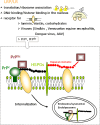Novel aspects of prions, their receptor molecules, and innovative approaches for TSE therapy
- PMID: 17151946
- PMCID: PMC11517296
- DOI: 10.1007/s10571-006-9121-1
Novel aspects of prions, their receptor molecules, and innovative approaches for TSE therapy
Abstract
1. Prion diseases are a group of rare, fatal neurodegenerative diseases, also known as transmissible spongiform encephalopathies (TSEs), that affect both animals and humans and include bovine spongiform encephalopathy (BSE) in cattle, scrapie in sheep, chronic wasting disease (CWD) in deer and elk, and Creutzfeldt-Jakob disease (CJD) in humans. TSEs are usually rapidly progressive and clinical symptoms comprise dementia and loss of movement coordination due to the accumulation of an abnormal isoform (PrP(Sc)) of the host-encoded prion protein (PrP(c)). 2. This article reviews the current knowledge on PrP(c) and PrP(Sc), prion replication mechanisms, interaction partners of prions, and their cell surface receptors. Several strategies, summarized in this article, have been investigated for an effective antiprion treatment including development of a vaccination therapy and screening for potent chemical compounds. Currently, no effective treatment for prion diseases is available. 3. The identification of the 37 kDa/67 kDa laminin receptor (LRP/LR) and heparan sulfate as cell surface receptors for prions, however, opens new avenues for the development of alternative TSE therapies.
Figures


References
-
- Achour, A. (2002). Phenothiazines and prion diseases: A potential mechanism of action towards oxidative stress. Int. J. Antimicrob. Agents20:305–306. - PubMed
-
- Adjou, K. T., Simoneau, S., Sales, N., Lamoury, F., Dormont, D., Papy-Garcia, D., Barritault, D., Deslys, J. P., and Lasmezas, C. I. (2003). A novel generation of heparan sulfate mimetics for the treatment of prion diseases. J. Gen. Virol.84(Pt. 9):2595–2603. - PubMed
-
- Alper, T., Cramp, W. A., Haig, D. A., and Clarke, M. C. (1967). Does the agent of scrapie replicate without nucleic acid? Nature214(90):764–766. - PubMed
Publication types
MeSH terms
Substances
LinkOut - more resources
Full Text Sources
Research Materials
Miscellaneous

